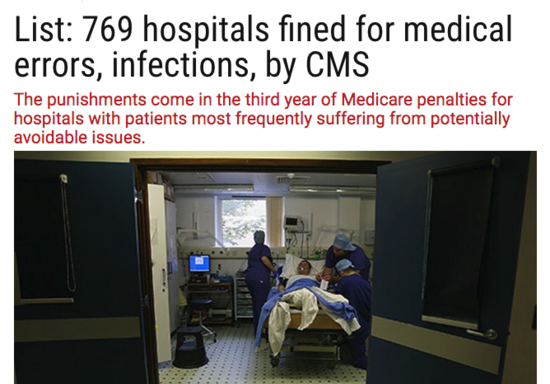The federal government has cut payments to 769 hospitals with high rates of patient injuries, for the first time counting the spread of antibiotic-resistant germs in assessing penalties.
The punishments come in the third year of Medicare penalties for hospitals with patients most frequently suffering from potentially avoidable complications, including various types of infections, blood clots, bed sores and falls. This year the government also examined the prevalence of two types of bacteria resistant to drugs.
Based on rates of all these complications, the hospitals identified by federal officials this week will lose 1 percent of all Medicare payments for a year -- with that time frame beginning this past October. While the government did not release the dollar amount of the penalties, they will exceed a million dollars for many larger hospitals. In total, hospitals will lose about $430 million, 18 percent more than they lost last year, according to an estimate from the Association of American Medical Colleges.
The reductions apply not only to patient stays but also will reduce the amount of money hospitals get to teach medical residents and care for low-income people.
Specialized hospitals, such as those that treat psychiatric patients, veterans and children, are exempted from the penalties, as are hospitals with the "critical access" designation for being the only provider in an area. Of the remaining hospitals, the Affordable Care Act requires that Medicare penalize the 25 percent that perform the worst on these measures, even if they have reduced infection rates from previous years.
That inflexible quota is one objection the hospital industry has with the penalties. In addition, many hospitals complain that they are penalized because of their vigilance in detecting infections, even ones that do not cause any symptoms in patients. Academic medical centers in particular have been frequently punished.
"The HAC penalty payment program is regarded as rather arbitrary, so other than people getting upset when they incur a penalty, it is not in and of itself changing behavior," said Nancy Foster, vice president for quality and patient safety at the American Hospital Association.
Federal records show that 347 hospitals penalized last year will not have payments reduced because their performance was better than others. Those include Harbor-UCLA Medical Center in Los Angeles, the Johns Hopkins Hospital in Baltimore and the University of Tennessee Medical Center in Knoxville.
Source: Healthcare Finance (View full article)
Posted by Dan Corcoran on January 8, 2018 11:18 AM



Post a comment